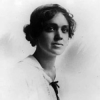Agnes Smedley

Agnes Smedley
Agnes Smedleywas an American journalist and writer, well known for her semi-autobiographical novel Daughter of Earth as well as for her sympathetic chronicling of the Communist forces in the Chinese Civil War. During World War I, she worked in the United States for the independence of India from the United Kingdom, receiving financial support from the government of Germany. Subsequently, she went to China, where she is suspected of acting as a spy for the Comintern. As the lover of...
NationalityAmerican
ProfessionAutobiographer
Date of Birth23 February 1892
CountryUnited States of America
Gambling in the mark has been the great indoor sport of the capitalists for months, and consequently food has increased by 25 to 100 per cent.
I feel like a person living on the brink of a volcano crater.
Much that we read of Russia is imagination and desire only.
And the woman who could win the respect of man was often the woman who could knock him down with her bare fists and sit on him until he yelled for help.
For the first week of the Sian events I was a first aid worker in the streets of Sian.
There are many men - such as those often to be found among the Indians - who are refined until they have qualities often attributed to the female sex. Yet they are men, and strong ones.
Thousands of women are crushed and made inarticulate by that system and never develop as their natures would force them to develop were they in a decent environment.
But settled things were enemies to me and soon lost their newness and color. The unknown called.
To die would have been beautiful. But I belong to those who do not die for the sake of beauty.
New York was a new and strange world. Vast, impersonal, merciless.... Always before I had felt like a person, an individual, hopeful that I could mold my life according to some desire of my own. But here in New York I was ignorant, insignificant, unimportant--one in millions whose destiny concerned no one. New York did not even know of my existence. Nor did it care.
Professors could silence me then; they had figures, diagrams, maps, books.... I was learning that books and diagrams can be evil things if they deaden the mind of man and make him blind or cynical before subjection of any kind.
I believe only in money, not in love or tenderness. Love and tenderness meant only pain and suffering and defeat. I would not let it ruin me as it ruined others! I would speak only with money, hard money.
So I had to be the doctor to these wounded men until we could remove them to the hospital. There were fifty-four women and forty little boys with the Red Army prisoners, and I went daily to take care of them also.
There's something dreadfully decisive about a beheading.